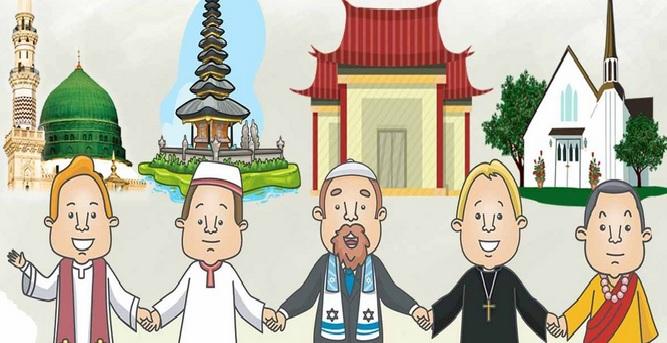The Role of Religious Leaders as the Front Line in Preventing Radicalism
As the country with the largest Muslim majority population in the world, Indonesia is known for its high pride in pluralism and moderate attitude in religious matters in accordance with the motto Bhinneka Tunggal Ika which is found in our national symbol, Garuda Pancasila.
However, the specter of radicalism has posed a significant challenge to this diversity. Radical ideology, which is often cloaked in religious rhetoric, threatens and disrupts the social harmony and national unity that Indonesia has fostered for decades.
Scholar and clergyman, Frans Magnis Suseno or Romo Magnis, explained that religious radicalism is nothing more than the takeover of religion by human short-sightedness and greed. Radicalism fakes religion into a tool of power, which disbelieves. In fact, people with radical views not only disbelieve adherents of other religions, but also adherents of their own religion. They replaced the word “we” with “us”, breaking the unity of the nation.
javascript:false
javascript:false
javascript:false
javascript:false
javascript:false
In this context, religious figures play an important role in preventing radicalism, being at the forefront of maintaining peace, and encouraging moderate interpretations of religious teachings.
Radicalism in Indonesia is rooted in various socio-political contexts. Starting from the Darul Islam (DI) rebellion in 1949-1962 to the rise of Jemaah Islamiyah (JI) in the early 2000s, radical groups attempted to establish an Islamic state or implement Sharia law through violence and coercion. In addition, the influence of global jihadist movements, such as ISIS, resonates with a small segment of Indonesian society, raising concerns about homegrown terrorism.
Religious leaders in Indonesia, known as ulama, kyai, and other titles, have significant influence in their communities. Their role is not only as spiritual guides, but also includes social, educational and even political fields. This broad influence positions them uniquely to combat radical ideologies.
One of the main ways religious leaders combat radicalism is by promoting moderate interpretations of Islam. Nahdlatul Ulama (NU) uses the slogan Islam Nusantara to emphasize the integration of Islamic teachings with local cultural values, while Muhammadiyah uses the slogan Progressive Islam to emphasize the purification of Islam and innovation in the field of education. These two largest Islamic organizations in Indonesia are at the forefront of spreading messages that oppose radical interpretations of Islam, emphasizing the religion’s core teachings of compassion and peace.
Education is an important battleground in fighting radicalism. Many religious leaders in Indonesia run Islamic boarding schools, which serve as important centers of religious education. By instilling a moderate understanding of Islam from a young age, these schools play an important role in shaping the religious perspectives of future generations. Curriculum reform that includes teaching religious tolerance, critical thinking, and the dangers of radicalism is essential in this effort.
In this regard, the Vice President of Indonesia, Ma’ruf Amin, hopes that the young generation in the country will be protected from exposure to radicalism because the resilience of the young generation is one of the main pillars in building a strong future for Indonesia. According to him, it is necessary to promote religious moderation and strengthen nationalism. Pancasila is a charter of agreement and has been proven to unite Indonesia.
Apart from that, religious leaders need to be actively involved in outreach programs that provide education to the public about the dangers of radicalism. These programs can take many forms, including sermons, public discussions, and media campaigns. By addressing the root causes of radicalization, such as socio-economic disparities and lack of religious knowledge, these initiatives aim to build resilience to extremist ideologies.
In some cases, religious leaders collaborate with government agencies and civil society organizations to implement deradicalization programs. These programs usually involve a combination of religious re-education, psychological counseling, and vocational training to help former radicals reintegrate into society. The credibility and moral authority of religious leaders can play an important role in the success of these initiatives.
Religious diversity in Indonesia also requires a collaborative approach to prevent radicalism. Religious leaders from various faiths often engage in interfaith dialogue, encouraging mutual understanding and respect. These dialogues help eliminate misunderstandings and reduce tensions between different religious communities, as well as foster an environment of peaceful coexistence.
Interfaith cooperation also extends to joint community projects addressing shared social problems, such as poverty, education, and disaster relief. By working together on these initiatives, religious leaders are demonstrating the practical benefits of interfaith harmony and building strong inter-community relationships that can withstand the divisive tactics of radical groups.
The threat of radicalism can also come from the internet and social media which have become powerful tools for radical groups to spread their ideology and recruit followers. Religious leaders in Indonesia have realized the need to fight digital radicalization. Many of them have an online presence, using social media platforms to spread moderate religious content and interact with the younger generation.
Digital literacy programs that educate the public about the dangers of online radicalization and how to critically assess online content are also important. By equipping individuals with the skills to safely navigate the digital landscape, religious leaders can help reduce the influence of radical ideology in cyberspace.
In conclusion, religious leaders in Indonesia play an important role in preventing radicalism, namely by leveraging their influence and moral authority to promote moderate religion, educate the public, and engage with at-risk communities. Through their efforts in education, community engagement, interfaith dialogue, and online presence, they act as the vanguard in maintaining social harmony and religious diversity in Indonesia.
While challenges remain, a collaborative and comprehensive approach can strengthen its impact and help build communities that are resilient and resilient to the threat of radicalism. By continuing to support and empower these leaders, Indonesia can uphold its traditions of religious tolerance and peace in the face of increasing radicalism.
